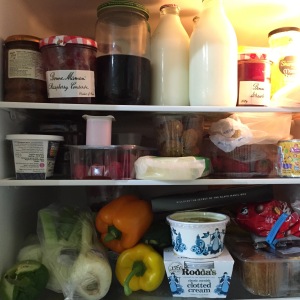 I am lucky. My fridge is full of food: mostly produced in the UK or Europe; all nutritious, safe and affordable; and almost all produced on conventional farms, with a small amount of organic food (in my case, chocolate). Given that you’re reading this, I’ll hazard a guess that you are lucky too. 795 million other people can’t say the same thing – and feeding all the people on a planet where 1 in 9 don’t currently have enough food is, in my view, our biggest challenge.
I am lucky. My fridge is full of food: mostly produced in the UK or Europe; all nutritious, safe and affordable; and almost all produced on conventional farms, with a small amount of organic food (in my case, chocolate). Given that you’re reading this, I’ll hazard a guess that you are lucky too. 795 million other people can’t say the same thing – and feeding all the people on a planet where 1 in 9 don’t currently have enough food is, in my view, our biggest challenge.
The fact that we face this challenge makes me really irritated when celebrity chefs who could make a huge difference, bow instead to popular rhetoric. In his latest blog post, mockney chef and food pundit Jamie Oliver proclaims that “…organic food is natural food, where nature has been allowed to do its thing, and I’m sure most of us will agree that putting natural ingredients into our bodies is only going to be a positive thing.”
If we ignore the nonsensical claim that natural ingredients produce positive results (Really? Let’s examine puffer fish, solanaceae poisoning, dangerous fungi, absinthe, the many consequences of obesity…), let’s simply look at his claim that organic food is natural. Except, well, it’s not. Agriculture first developed ~12,000 years ago, and ever since then farmers have been doing their best to breed crops and animals that are best suited to their farming system, whether it’s organic or conventional. Want dairy cows that produce high-quality milk from grazing pasture; leaner pork chops; or strawberries that can survive supermarket handling? You’ve got it. All achieved through traditional breeding techniques (otherwise known as “nature doing its thing”): noting that plant or animal A has desirable characteristics and breeding it with plant or animal B to (hopefully) produce better offspring. No scary chemicals, scientists with syringes or genes in test-tubes. Every farm in the world is founded on “nature doing its thing” – not just the organic farms. We can argue whether GMO crops are natural (breeding techniques are simply more refined and specific) or not (scientists playing god…) but that argument becomes redundant in the EU and many other regions, where GMO crops are not approved.
Can organic producers use pesticides? Yes, if they’re compounds approved for organic production (e.g. highly-toxic copper-based fungicides). Can they use antibiotics and wormers? Again yes, if a proven disease problem exists (note that rules differ slightly between the UK and USA). Are organic farmers just merrily sitting back and letting their crops cross-pollinate and reseed, and their bulls run around happily “doing their thing” to whichever cow they come across? No. It’s a beautiful bucolic image to suggest that organic farmers are happily working with Mother Nature whereas conventional farmers have an evil scientist sitting on one shoulder and a big agribusiness corporation on the other, but its simply not true.
According to Mr Oliver, “…the simple fact is that often we don’t actually have to interfere with nature.” The idea of a world where we could feed over 7 billion people without having to actually invest any research dollars into improving food production is lovely, but it’s smoke and mirrors. At the most basic level, what happens if we don’t “interfere” by controlling weeds (whether by chemicals, mechanical tillage or human labour)? Crop yields are reduced, food production goes down and we feed and clothe fewer people. What happens if a cow has problems giving birth? In nature, she dies. On a farm (whether organic or conventional) both she and the calf are saved, providing milk and meat for us to eat. According to the World Organisation for Animal Health, 20% of global animal protein losses are due to diseases for which treatments already exist – we simply need to make them available to every farmer worldwide. Just think how many more people we could feed if we interfered with nature in that way?
Huge amounts of research monies are invested each year to find ways to improve food production on both organic and conventional farms worldwide. Some are highly technical, others are simple, but all are contributing to the goal of feeding the world. Unfortunately, when food pundits jump on the “let’s promote system X” bandwagon as Mr Oliver has done with organic production, using persuasive but false arguments, we lose traction in fulfilling the real goal. Rather than arguing about which foods we can/should be buying, we need to accept that there’s a place for all systems; examine the ways in which all systems can improve soil fertility, animal health and environmental impacts; and make faster progress towards feeding the world while still enjoying our food choices.
If I Bill, Am I A Shill? Why Travel Funding and Speaker Fees Don’t Equal Industry Bias.
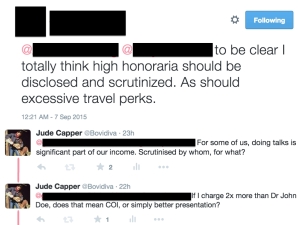 A New York Times article published this week questioned the ethics of large companies funding travel for scientists to “promote” technologies or agendas. The quotation marks are there because the gist of the article (and related Twitter debate) is that if scientists have travel costs or speaker fees paid by industry, their scientific expertise and credibility is at best suspect, at worst, massively biased by a conflict of interest (COI).
A New York Times article published this week questioned the ethics of large companies funding travel for scientists to “promote” technologies or agendas. The quotation marks are there because the gist of the article (and related Twitter debate) is that if scientists have travel costs or speaker fees paid by industry, their scientific expertise and credibility is at best suspect, at worst, massively biased by a conflict of interest (COI).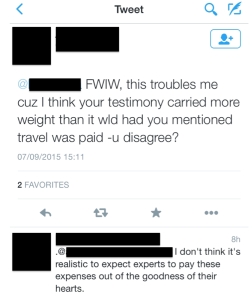 However, accepting speaker fees or travel expenses apparently makes me a less credible expert, because some journalists and food pundits consider that scientists must be biased by their funding sources.
However, accepting speaker fees or travel expenses apparently makes me a less credible expert, because some journalists and food pundits consider that scientists must be biased by their funding sources.Activism 101 – How to Write Like An Angry Internet “Expert” on GMOs
 Last week I had the pleasure of speaking at the Montana Grain Growers Association on the topic of agricultural myths – specifically those relating to the wheat and barley industry. It was a whole new experience for me to replace calving rates with seeding rates; and crossbred cows with hybrid corn; but I was intrigued to see how many similarities existed between the grain industry and the beef industry in terms of the challenges we’re faced with in terms of misconceptions and bad science.
Last week I had the pleasure of speaking at the Montana Grain Growers Association on the topic of agricultural myths – specifically those relating to the wheat and barley industry. It was a whole new experience for me to replace calving rates with seeding rates; and crossbred cows with hybrid corn; but I was intrigued to see how many similarities existed between the grain industry and the beef industry in terms of the challenges we’re faced with in terms of misconceptions and bad science.
In the beef industry we’re often told that cattle are killing the planet by belching greenhouse gases; steak contains so many hormones that our kids are going to look like Pamela Anderson by the age of 5; and that we routinely mistreat our animals in the name of profitability – none of which are remotely true. However, many of the myths relating to the arable crop industry seem to revolve around genetically-modified organisms (GMOs) – the very mention of which appear to evoke rage, sanctimoniousness and downright insanity in many internet pundits.
Researching the GMO topic gave me so many examples of bad science that I could have spoken for three hours and still have had slides left over – so here, for your edification, is my quick cut-out-and-keep guide to writing like an angry internet GMO “expert”.*
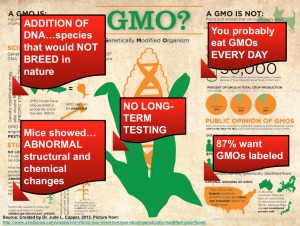 1) Always use capital letters to emphasize the negative. The more capital letters you use, the more powerful your message BECAUSE YOU’RE OBVIOUSLY SHOUTING! Everybody knows that shrieking like a hyena on acid gets your point across, right?
1) Always use capital letters to emphasize the negative. The more capital letters you use, the more powerful your message BECAUSE YOU’RE OBVIOUSLY SHOUTING! Everybody knows that shrieking like a hyena on acid gets your point across, right?
2) Remember that science is the enemy. Yes, it brought us the polio vaccine, organ transplants and the iPhone that’s rapidly giving you repetitive strain injury of the thumbs, but when it comes to food, it’s pure evil. Anybody who has a PhD is less believable than your Great-Aunt Edna’s story about the day she met JFK in Walmart, whereas the opinion of a liberal arts major who cites Wikipedia, Deepak Choprah and Michael Pollan is worth more than rubies.
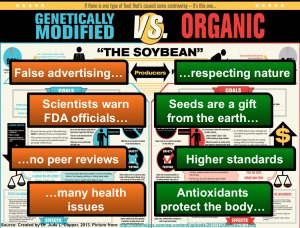 3) Make sure you use emotive language. Your food system of choice is entirely populated by fluffy animals that poop rainbows, fart glitter and graze happily upon plants that are identical to those grown by the pilgrim fathers. By contrast, the dark side has mega-herds of mutated hybrid creatures that snack on household pets unwary enough to wander into their pen; malevolent trees that fling apples at Judy Garland; and man-eating, trash-talking plants last seen in the Little Shop of Horrors.
3) Make sure you use emotive language. Your food system of choice is entirely populated by fluffy animals that poop rainbows, fart glitter and graze happily upon plants that are identical to those grown by the pilgrim fathers. By contrast, the dark side has mega-herds of mutated hybrid creatures that snack on household pets unwary enough to wander into their pen; malevolent trees that fling apples at Judy Garland; and man-eating, trash-talking plants last seen in the Little Shop of Horrors.
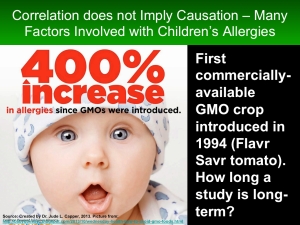 4) Cause-effect statistics are only used by scientists (see #2) and thus poison the virtuous well of truth. Far better to make spurious claims based on nebulous associations. If the claims relate to children, the elderly or other vulnerable populations, so much the better. The Flavor-Savr GMO tomato was introduced in 1994 and childhood allergies have increased 400% since then? Excellent. Despite the fact that the World Health Association has stated that there is no link between GMOs and allergies, the two must (MUST!) be related. Since 1994, we’ve also seen the introduction of Obamacare, the death of Princess Diana, and the Green Bay Packers have won the Super Bowl three times. OMG! GMOs killed Princess Diana!
4) Cause-effect statistics are only used by scientists (see #2) and thus poison the virtuous well of truth. Far better to make spurious claims based on nebulous associations. If the claims relate to children, the elderly or other vulnerable populations, so much the better. The Flavor-Savr GMO tomato was introduced in 1994 and childhood allergies have increased 400% since then? Excellent. Despite the fact that the World Health Association has stated that there is no link between GMOs and allergies, the two must (MUST!) be related. Since 1994, we’ve also seen the introduction of Obamacare, the death of Princess Diana, and the Green Bay Packers have won the Super Bowl three times. OMG! GMOs killed Princess Diana!
5) The only exception to #’s 2 and 4, are when a paper published in the Obscure Seattle-based Journal of Bad Science and Tomfoolery funded by the People’s Commission for Proving that GMO’s are Gonna Kill Ya Folks reports that if you force-feed three mice with 75x their body weight of pesticide-resistent plants, the resulting death by lab-worker hand (mouse head, meet bench-top) was caused by GMOs, and happens to agree with your views. Cite it as often as possible and gloss over the fact that the journal editors retracted it based on bad science three weeks after publication. They were obviously manipulated by Big Pharma (see #6).
 6) Any food that contains GMOs is a Frankenfood, guaranteed to turn you into a Herman Munster lookalike riddled with tumors the size of cabbages and to result in certain death. The only reason why most death certificates cite cancer, stroke or heart attack as the cause of death is because the medical profession have been paid off by Big Pharma. Anybody who dies in a car accident was assassinated because they knew too much (see #4, Princess Diana).
6) Any food that contains GMOs is a Frankenfood, guaranteed to turn you into a Herman Munster lookalike riddled with tumors the size of cabbages and to result in certain death. The only reason why most death certificates cite cancer, stroke or heart attack as the cause of death is because the medical profession have been paid off by Big Pharma. Anybody who dies in a car accident was assassinated because they knew too much (see #4, Princess Diana).
7) There are only three types of farmers and ranchers. Large farmers (more than 100 cows or acres) sit in their money-pit all day, cackling and swimming in vaults of gold coins like Scrooge McDuck. Everybody knows they have more money than all the European nations combined; force innocent immigrant workers to apply toxic pesticides whilst only clad in a loincloth made from a flour sack; and are singlehandedly responsible for every incidence of cancer, heart disease and diabetes. Midsize farmers (20-100 cows or acres) are utterly at the mercy of Big Pharma/Big Food and have become mindless zombies, planting whatever mutant seed the corporations tell them to. Small farmers (less than 20 cows or acres) are the salt of the earth and will inherit it come the revolution. End of story.
8) Corporations have billion dollar budgets and their CEOs spend all their time partying with tobacco-smoking lobbyists. Lobbying by small organizations is done by worthy volunteers who’re just trying to make the world a better place for your innocent children. For the love of God, won’t somebody think of the children?
9) If all else fails, invoke the name of the evil that must be named….ahem, Monsanto. If you say it three times into a mirror, an ancient agricultural god will appear and wreak vengeance upon the earth. Honestly, I saw it on Oprah.
*Note that being an “expert” does not involve education, higher degrees or being employed within the industry in question. Nowadays you can only be an expert if you are entirely impartial, third-party, and preferably know nothing whatsoever about the system in question. On that basis, I’m off to write a book about Zen Dentistry.
Does He Who Pays the Piper Really Call the Tune?
I love Forbes.com. Not because they put out a nice article on our previous work a couple of years ago (although it did make a refreshing change) but because of the following quote in a Forbes blog post by Trevor Butterworth:
Yes, the topic of industry funding of scientific research is tantalizing for journalists because it implies corruption, but the reality is that most universities depend on their science departments to bring in research grants from private as well as government sources (35 percent or more is taken by the university as “overhead”). Grants for research on Shakespeare do not, a university’s upkeep, pay for. More to the point, scientific research is good if it is done well, not simply because the researchers doing it are independent.
Picture the scene, just as it has occurred so many times. I’m at the end of a conversation with a journalist, during which the interviewer seems to genuinely “get” that improving productivity and efficiency in livestock systems has beneficial environmental and economic effects, just as it does in any other industry.
“Just one last question,” says the interviewer, in a casual tone, “Where do you get your funding?”
“Why, the livestock industry.” I answer.
Stunned silence. I can almost hear the crackling and hissing as the interviewer’s hair spontaneously combusts. Surely that simple 2+2=4 math that we just discussed is now biased! Flawed! Bought and paid for! This “impartial” University researcher is nothing but a pawn of big ag! An industry zombie!
Don’t get me wrong, I’m not claiming that my research is flawless. Any mathematical modeling work is only as good as the data that goes into it and our models are evolving all the time. However, I am really tired of the old adage that industry dictates the results of scientific, peer-reviewed research. If anyone has a bright idea as to who will fund applied livestock research aside from industry, send me a link to the call for proposals and if mine gets funded I’ll laud you to the heavens in the acknowledgements section.